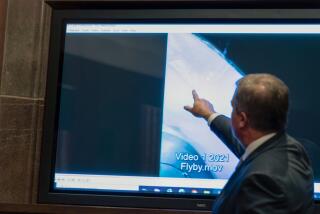Will Deal With Star Wars Defense : UCSD’s Sorenson to Head Air Force Scientific Team
- Share via
LA JOLLA — Harold Sorenson has been intrigued with questions of guidance and navigation since working a quarter-century ago on the Atlas, America’s first true ballistic missile.
Beginning July 1, the UC San Diego professor of engineering sciences will be given responsibility for control systems crucial to the response of the U.S. Air Force in crisis situations--ultimately, a response to nuclear attack.
On that date, Sorenson will become the chief scientist for the Air Force, reporting to the Air Force chief of staff at the Pentagon from a position Sorenson calls “the technical conscience of the Air Force.”
“Command and control systems are my interest, and the biggest and most complex are in the Air Force,” Sorenson said following the announcement last week of his appointment.
Indeed, Sorenson will be assuming the top technical post at the same time the Air Force is undertaking research on its most complex weapons proposal ever: President Reagan’s controversial Strategic Defense Initiative, commonly known as Star Wars.
The soft-spoken Sorenson, a UCSD professor since 1968, has often been a consultant to the Air Force during his academic career and since 1981 has served on weapons and missile panels of the Air Force Scientific Advisory Board. He headed a small “think tank” near UCSD from 1973 to 1981 that applied engineering research to military problems.
“I’m comfortable with government work, although I believe no classified (restricted) work should be done at universities and so I have done no weapons work here,” Sorenson said. “It’s different, however, when I have had consulting contracts for research on navigation and guidance.”
The proper relationship between universities and the armed services has long been an unresolved issue among academic and military officials. The issue has taken on new meaning with the questions that have been raised over whether Star Wars research itself might destabilize the strategic balance between the United States and the Soviet Union.
Sorenson said that there have been no ethical questions he has been unable to resolve personally during his long association with Air Force projects. He believes that people such as himself are necessary to bridge the gap between scientists and government.
“Research on technical questions satisfies me,” Sorenson said, adding that he is apolitical and pleased his new position does not involve making policy. On the job, Sorenson said, he will examine projects from a technical view and will not serve as an Air Force spokesman.
“Of course, I do have a philosophy and political beliefs, which are that we live in a world where hostile forces are around us and the Department of Defense is defense and not a Department of War.
“That is my rational train of thought: our society is a nice place to live.” With a smile, Sorenson added that only occasionally does he ponder the ultimate consequences of his work “and think maybe it’s time to head for New Zealand.”
Sorenson said President Reagan is correct in pursuing research on an enhanced defense system to protect the country from enemy missile warheads.
“The idea has been sold initially as a 100% effective shield and if the opponents are saying it can’t be built to that effectiveness yet, that is reasonable to say,” Sorenson said. “It will require (technical) complexity far beyond anything attempted to this point.
“But I believe that the research should contribute to improvements in defense that otherwise might not come about. There certainly can be no glib answers.”
The United States is planning to spend $26 billion on Star Wars research. That is far more money than has ever been dispensed for any non-military research project funded by such federal agencies as the National Science Foundation or National Institutes of Health.
“We do spend a lot of money on defense,” Sorenson said, “and money certainly determines a lot of the (type of) research that scientists will do.” But he said that the United States still spends less than the Soviets, who he said may be ahead of us at this time on certain aspects of Star Wars research.
“The Soviets are very capable technically on military matters,” Sorenson said.
Because Star Wars is the best known of major Air Force projects and already under intense scrutiny, Sorenson said, he might look at other highly complex and important systems that have received less public attention. Sorenson listed as one candidate the Midgetman missile, a single-warhead mobile missile that might be based on trucks or railroad cars to avoid precise Soviet targeting.
“I also might look at overall command and control systems, to see how effective the exchange of information with a tactical commander is prior to initiating combat,” Sorenson said.
“How best can such a commander get information and put it to use? We’ve gone so heavily toward technology, but systems are more than building boxes. How do you present the information so that a commander can absorb it quickly?”
Sorenson hopes to spot technical weaknesses in terms of how effective a particular system will prove. In some cases, his responsibility will be to recommend which project among similar competing systems should be pursued.
Sorenson will have no qualms about telling his superiors what looks promising and what does not.
“I will have the ear of those in power, but I am to bring an objective, outside view,” he said. “My job is temporary--a two-year stint--and I’m not worrying about pleasing my boss.”






